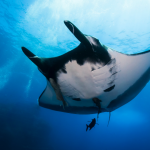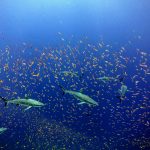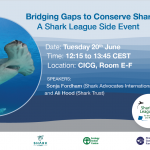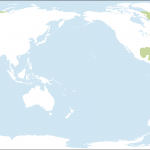EU promotes whale shark protection and risky blue shark quotas as Japan blocks finning measure
The Press Release is available in French and Spanish
Cairo, Egypt. November 20, 2023. The Shark League member groups are heralding conservation advances for imperiled Atlantic sharks and rays at this year’s meeting of the International Commission for the Conservation of Atlantic Tunas (ICCAT) while warning that new measures are still insufficiently cautious to properly safeguard such inherently vulnerable species. ICCAT Parties agreed provisional protections for mantas and devil rays, as well as whale sharks, reduced quotas for heavily fished blue sharks, and improved processes for ensuring that nations comply with ICCAT fishing and data reporting requirements. Many of the improvements reflect recommendations made in a new Shark League gap analysis.







